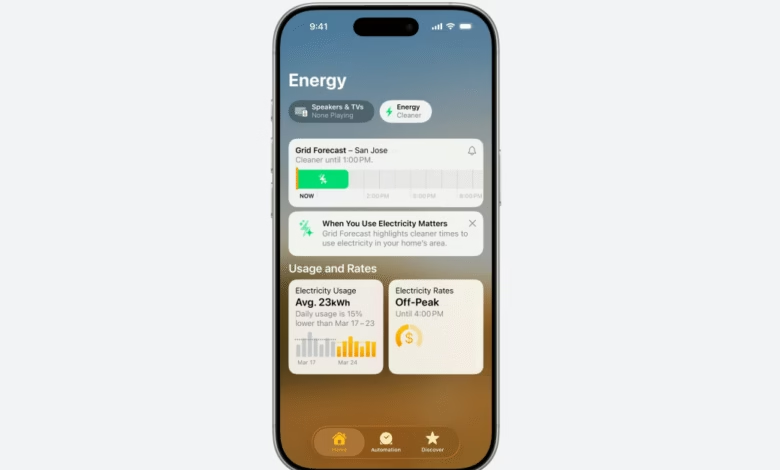Apple Home Adds New Energy Management Tools

▼ Summary
– Apple introduced EnergyKit, a new framework for developers to integrate energy data from Apple Home to optimize device electricity usage based on cleaner or cheaper energy.
– The Home app can display electricity usage, rates, and clean energy availability via the Grid Forecast widget, currently only supporting PG&E as a utility provider.
– EnergyKit Guidance allows developers to create actions for devices like EV chargers and smart thermostats to reduce or shift energy use based on utility data.
– Apple Home may evolve into a home energy management system (HEMS), though it currently lacks support for energy monitoring of devices like EV chargers or thermostats.
– Apple’s involvement in the Matter smart home standard suggests future support for energy-monitoring devices in Apple Home, despite its current limitations.
Apple’s Home app is quietly gaining powerful new energy management capabilities, though these updates flew under the radar during WWDC. While the keynote didn’t mention smart home innovations, a developer video revealed EnergyKit, a framework that lets third-party apps tap into home energy data to optimize electricity usage. This could mean smarter thermostats that adjust based on peak pricing or EV chargers that schedule sessions during low-rate periods.
Currently, the Home app displays electricity usage and rates when linked to utility providers, though only PG&E is supported at launch. The new EnergyKit Guidance feature takes this further by enabling developers to create automated actions, like reducing HVAC runtime when grid demand spikes or shifting appliance use to cleaner energy windows. Initially, the system works with EV chargers and smart thermostats, mirroring functionality already offered by brands like Ecobee and Google Nest.
What makes EnergyKit intriguing is its potential to evolve Apple Home into a centralized home energy management system (HEMS). Right now, it merely passes data to manufacturer apps, but future updates could bring direct control over devices within the Home app itself. Competitors like Samsung SmartThings and Homey already offer similar AI-driven energy optimization, leaving Apple playing catch-up in this space.
The focus on developer integration suggests Apple recognizes its platform’s current limitations, native support for EV chargers and detailed energy monitoring remains absent. However, with Apple’s heavy investment in the Matter smart home standard, broader device compatibility could arrive soon. For now, EnergyKit lays the foundation for what might eventually become a comprehensive hub for managing home efficiency, costs, and sustainability, all from one interface.
(Source: The Verge)

